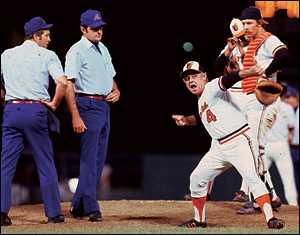
Tom Verducci has a nice long profile of Earl Weaver in the current edition of SI:
As we are watching this 21st-century game in Fort Lauderdale, I ask Weaver if he has ever heard of moneyball.
“Moneyball?” he says, bewildered. “No.”
I tell him it’s shorthand for how Oakland gained a competitive edge by understanding, among many other things, the value of on-base percentage. “Ohhhhh, wait … a … minute!” Weaver bellows. “That was my favorite right there, on-base percentage! Don Buford wasn’t getting to play under Hank Bauer [Weaver’s predecessor]. He’d get in a ball game every now and then and feel like he had to get three or four hits. I told Buford, ‘I’m willing to play you as long as you have a .400 on-base percentage.’ All of a sudden he becomes a regular, and he’s walking a hundred times and hitting right around .300.” Buford had played 669 career games before Weaver was named Orioles manager on July 11, 1968. His OBP was .335. He played 617 games over the rest of his career, all for Weaver. His OBP under Weaver was .388.
Before Moneyball, before Beane, before Bill James—but not quite before Copernicus—Weaver, a white-haired gnome who never played a day of major league baseball, knew what worked. The most recent generation of general managers, armed with their computer printouts and Ivy League–educated assistants, all channel something from the Earl of Baltimore.
“I’ll tell you one thing he did that we all learned from,” Red Sox general manager Theo Epstein says. “He would develop arms on the big league level by bringing up a young pitcher and putting him in the bullpen, mostly out of long relief. Once he got some experience he could move into the rotation. The Twins did it with [Johan] Santana to perfection.”



The amusing part about Moneyball is what the MSM thinks are its main tenets have been advanced by baseball men since the game began. "A walk is as good as a hit" is probably as old as the game itself. Earl Weaver was pro-walk and power and anti-SB and small ball long before Billy Beane.
[0] I watch that clip every few months, and it makes me laugh every time. Meanwhile, this catches the eye:
And Allen Roth was all about those philosophies when he was the statistician for the Brooklyn Dodgers years before Weaver.
[3] I had heard or read someplace that the Dodgers basically invented OBP as an evaluation tool, back in the 40s or 50s.
[1] And as william implies, the funniest part of all is that Moneyball wasn't about OBP and power and not stealing and anti-small ball at all. It was about finding market inefficiencies and exploiting them to Oakland's advantage, because Oakland had fewer resources to work with.
That was the genius of Moneyball, not that OBP was good. It was nice to have OBP is good become widely known, though.
monkeypants, check out "The Numbers Game," by Alan Schwartz. It's got a good history of Roth and the Dodgers.
[6] And I see from Wikipedia that Allen Roth was from Montreal!
[6] Among many other things. Not a great book, unfortunately, but well worth the read as it's a brief, but comprehensive history of more than a century of baseball statistics and analysis.
Branch Rickey (who hired Roth) and Earl Weaver are deities in the sabermetric community. I think one recent edition of the Baseball Prospectus annual quoted Branch Rickey in more than half the chapters.
One of the things I love about having Ken Singleton on the YES broadcasts, behind his smooth delivery and affable nature, is that he was/is an Earl Weaver man through and through. Walks and three-run homers . . .
Btw, Moneyball has been officially relegated to development hell...
Does anyone know who the umpire is in that clip? He's great.
Fantastic article, thanks for the link.
[9] Thankfully..would have been a terrible film..
[10] I just read in Verducci's article that it's Bill Haller.